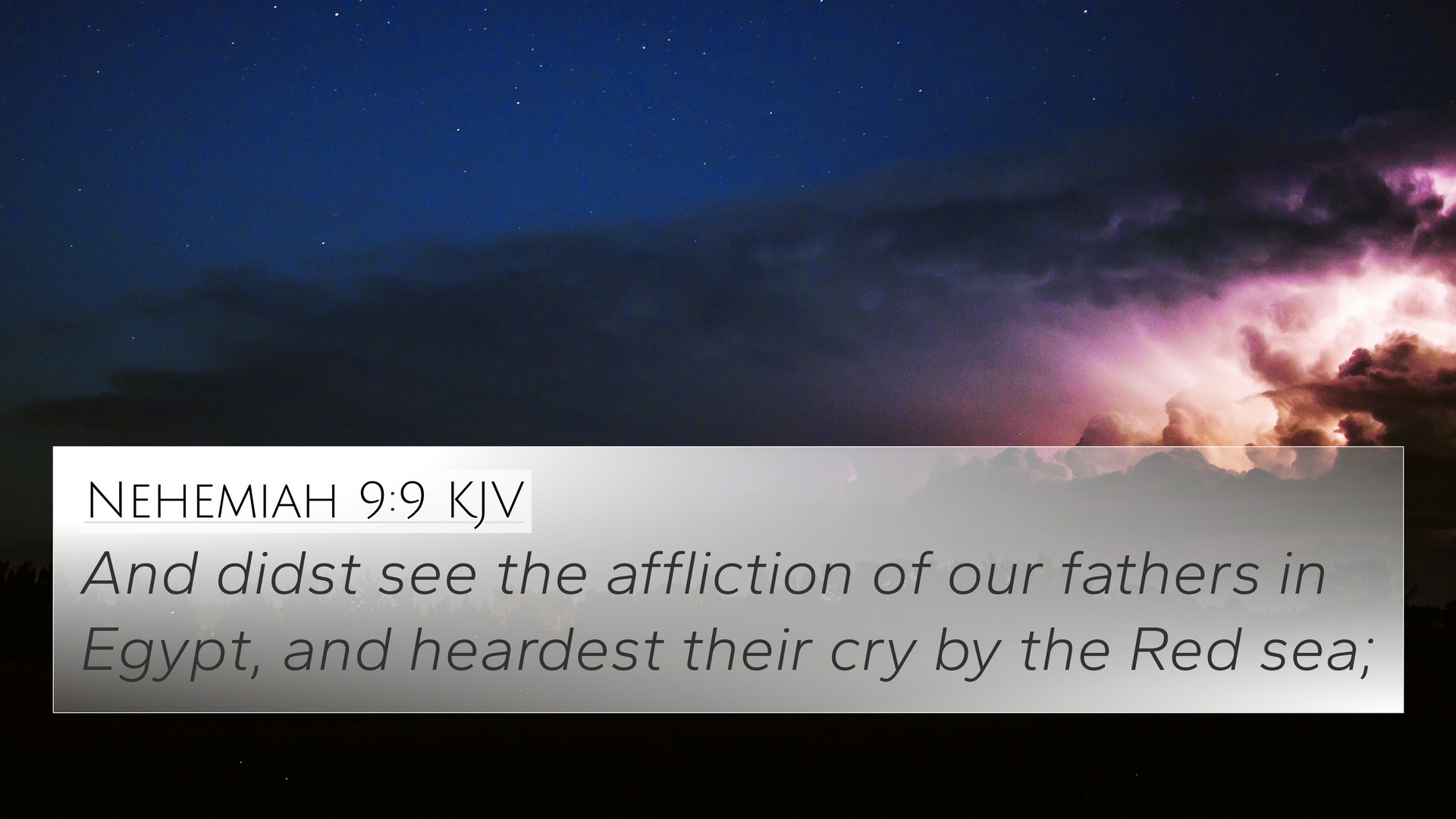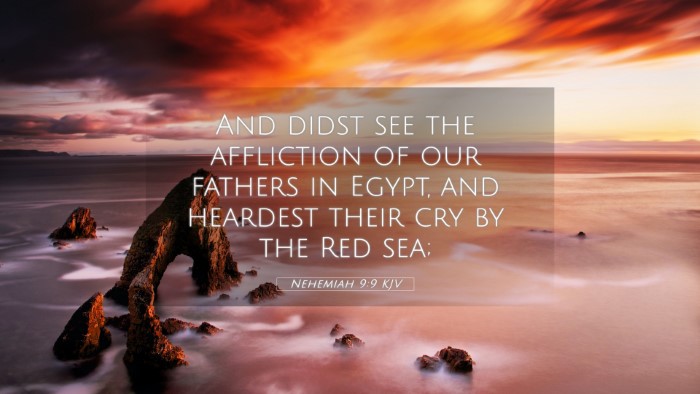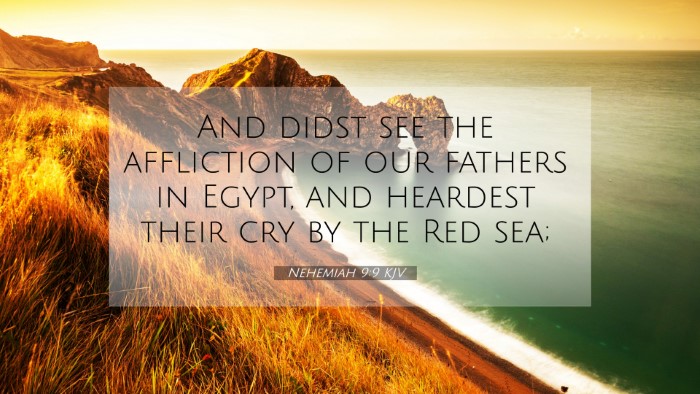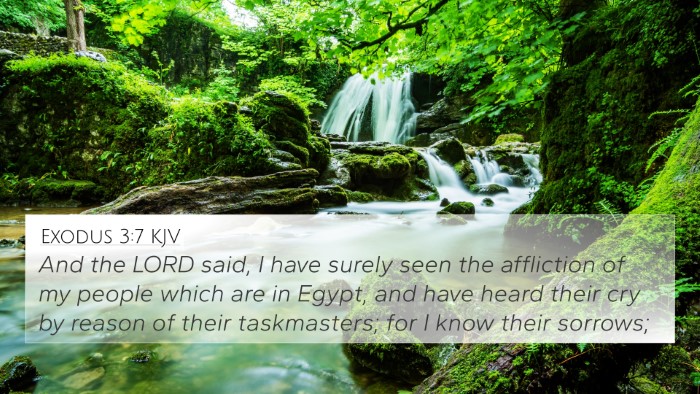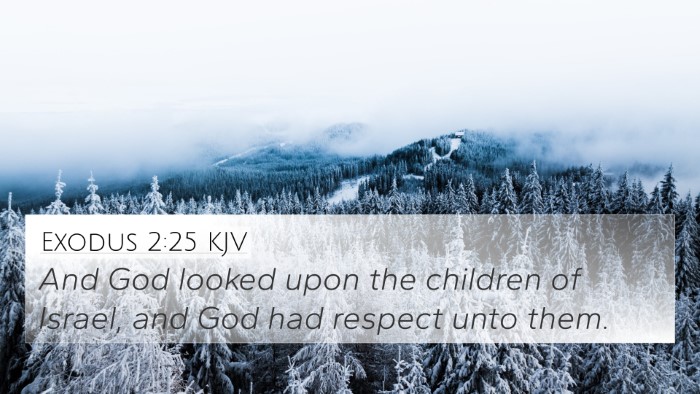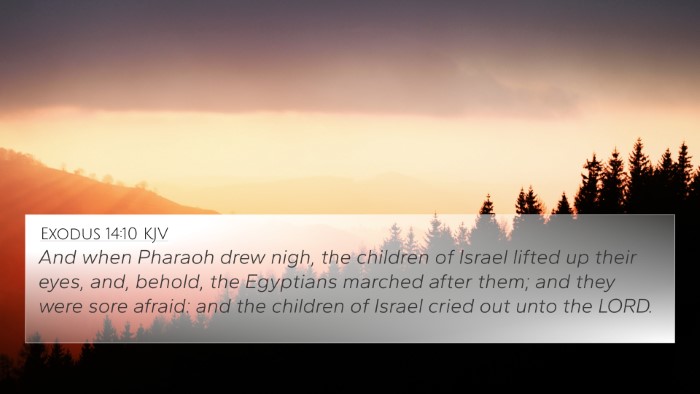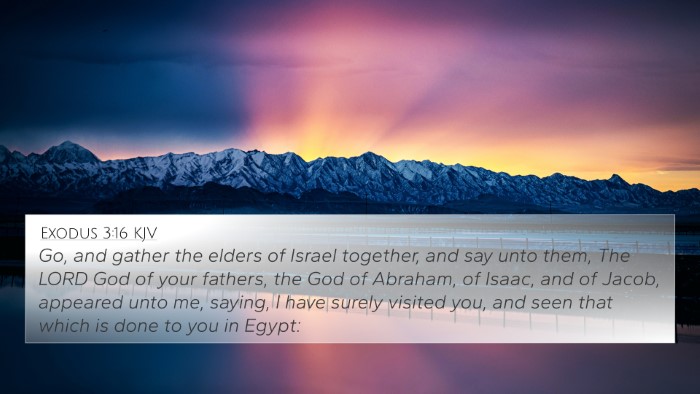Understanding Nehemiah 9:9
Nehemiah 9:9 states: "And didst see the affliction of our fathers in Egypt, and heardest their cry by the Red sea." This verse captures a pivotal point in Israel's history, reflecting God's awareness of the suffering of His people and His readiness to intervene on their behalf.
Meaning and Insights from Public Domain Commentaries
This verse is significant in recognizing God’s attentive nature towards His people during their times of distress. The commentaries by Matthew Henry, Albert Barnes, and Adam Clarke collectively offer insights that deepen our understanding.
Matthew Henry's Commentary
Matthew Henry emphasizes God's compassion and mercy toward the Israelites during their enslavement in Egypt. He provides an explanation of how God not only sees but also feels the plight of His people. Henry points out that this moment illustrates God's character as one who responds to the cries of the oppressed.
Albert Barnes' Notes on the Bible
Albert Barnes provides a detailed analysis of the historical context surrounding this verse. He notes that the "Red Sea" represents a significant turning point where God delivered His people from bondage. Barnes highlights the importance of remembering these events as an essential aspect of Israel's identity and faith.
Adam Clarke's Commentary
Adam Clarke expands on the phrase "didst see the affliction," stressing that God’s perception is not a passive observation but an active engagement with human suffering. Clarke connects this verse to the covenantal relationship God has with Israel, reinforcing that God's interventions are deeply tied to His promises and faithfulness.
Connecting with Other Scripture Verses
To fully appreciate Nehemiah 9:9, it is beneficial to explore its cross-references, which reveal thematic and narrative links throughout the Bible. Here are several key verses:
- Exodus 3:7: "And the LORD said, I have surely seen the affliction of my people which are in Egypt..." - This verse underscores God's awareness of their suffering.
- Exodus 14:10: "And when Pharaoh drew nigh, the children of Israel lifted up their eyes..." - This describes the direct context of their cry at the Red Sea.
- Psalm 34:18: "The LORD is nigh unto them that are of a broken heart..." - A verse that reflects God's nearness to those in distress.
- Psalm 106:7: "Our fathers understood not thy wonders in Egypt; they remembered not the multitude of thy mercies..." - A reference that highlights the historical narrative and God’s merciful nature.
- Isaiah 63:9: "In all their affliction he was afflicted..." - This verse parallels Nehemiah 9:9 in emphasizing God’s identification with His people's suffering.
- Acts 7:30-36: The speech of Stephen that recounts Israel's history, including their cry during Egyptian bondage.
- Hebrews 11:29: "By faith they passed through the Red Sea as by dry land..." - This emphasizes the faith of the Israelites in their deliverance.
Thematic Connections
Nehemiah 9:9 is intricately connected to several Biblical themes:
- **Suffering and Redemption:** The theme of God's intervention during times of suffering resonates throughout scripture.
- **Faithfulness of God:** God's unwavering fidelity to His covenant plays a central role in the narrative of Israel.
- **Divine Compassion:** The recognition of God’s compassion towards His people in their struggles is a recurring biblical motif.
Tools for Bible Cross-Referencing
For those interested in exploring the connections between Bible verses, various tools and methods can assist in this journey:
- **Cross-reference Bible study guides** offer structured ways to navigate related verses.
- Using a **Bible concordance** can help locate verses that share themes or specific words.
- A **Bible reference resource** or **linking Bible scriptures** can illuminate the connections between disparate biblical texts.
- Engaging in **cross-referencing Bible study methods** helps deepen understanding of the scripture’s messages.
Concluding Thoughts
Nehemiah 9:9 stands as a testament to God's compassionate nature. The insights from the public domain commentaries, together with the cross-references provided, reveal a rich theological tapestry that illustrates the interconnectedness of the scripture. As believers dive into these connections, they gain a deeper understanding of the biblical narrative and, more importantly, of God's unwavering presence in moments of suffering.
Further Exploration
To enhance your understanding of scripture, consider the following questions:
- What are some other instances in the Bible where God intervened during moments of distress?
- How do the themes of suffering and redemption reflect in both the Old and New Testaments?
- In what ways does Nehemiah 9:9 impact our understanding of God's relationship with humanity today?
